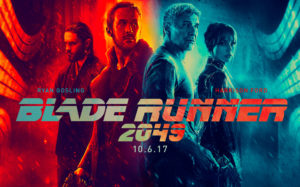Last night’s plans for board and card games fell apart and turning lemon into lemonade I took the opportunity to see Blade Runner 2049.
Blade Runner 2049 as the name suggests is a sequel to 1982’s classic SF film Blade Runner. The original movie was set in Los Angeles 2019 and concerned a policeman, Rick Deckard, played by Harrison Ford, who was a Blade Runner, someone who hunted down and killed  rouge androids called replicants. Through the course of first film Deckard learns empathy for the replicants and eventually flees with one, becoming a fugitive himself. It is a source of endless debate if Deckard is truly human or a replicant himself. (The director Ridley Scott is adamant that he is and Harrison Ford is equally adamant that Deckard is human.) Now is it thirty years later, and we are again following a policeman/Blade Runner as he pursues a mystery concerning replicants from the original film and an impossibility of their existence.
rouge androids called replicants. Through the course of first film Deckard learns empathy for the replicants and eventually flees with one, becoming a fugitive himself. It is a source of endless debate if Deckard is truly human or a replicant himself. (The director Ridley Scott is adamant that he is and Harrison Ford is equally adamant that Deckard is human.) Now is it thirty years later, and we are again following a policeman/Blade Runner as he pursues a mystery concerning replicants from the original film and an impossibility of their existence.
Where the first film’s foundation lay in ambiguity Blade Runner 2049 deals with more explicit information, but doesn’t sacrifice the deep philosophical questions that drove the original including what is it that makes us human. To explore these questions in addition to the replicants, the writers have added digital artificial intelligences creating a world that is awash with people who aren’t considered ‘human.’ The Film’s protagonist is ‘K’, and he status as a replicant is made clear from the earliest scenes of the story. That he is hunting his own kind is one of the sources of tension for the story. As he uncovers secrets and mysteries about the events of the original film, K discovers truths about himself and the world around him.
Clocking in at two and three quarters hours Blade Runner 2049 is not a short film, but it did not feel overly long. This is a movie comfortable in its pacing, and well footed enough to slow down and explore ideas and characters without fearing that it might bore the audience. (Though that itself makes it a movie for everyone. There were walkouts about halfway through last night’s screening. However the original Blade Runner failed at the box office and because a classic, revered and studied to this day.) A tricky aspect to crafting a sequel is what do you do about the fact that world has moved on since the first movie? Even in 1982 setting Blade Runner in 2019 was overly optimistic about technological advances and now the original simply is impossible. The filmmakers solution was to treat the Blade Runner setting a parallel time-stream and continue forward along it, ignoring reality’s conflicts. (Though I wonder how many of the younger audience member’s understood the significance of the CCCP in the world-building.) With frequent nods to the original film and even the original novel, Blade Runner 2049 is a respectful and intelligent film from the man who directed last year’s equally smart movie Arrival. I can’t wait to see what he does with Dune.
